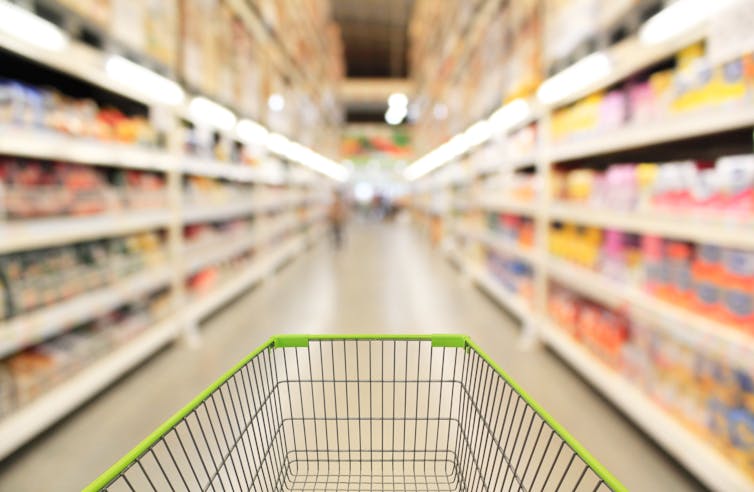
the supermarket business model is too fragile to shield customers from rising food prices
Meals rates, like nearly all the things else, are mounting rapidly. There have a short while ago been warnings of “apocalyptic” expenses, and a declaration that the “era of low cost food” is in excess of.
This sort of announcements have been linked to creaking economies seeking to get better from the pandemic and the consequences of war in Ukraine, a person of the world’s biggest exporters of meals.
But to completely have an understanding of why foods prices cannot be stored down, and what could be done to enable struggling homes, we require to glimpse at how our supermarkets actually make income. My analysis shows that the current system has been well balanced on a knife edge for some time.
The point is that most of the earnings from advertising meals with very minimal margins at extremely significant volumes is swallowed up in overheads such as payroll and the expenditures of operating outlets and distribution centres. This has three results on supermarket economics truly worth contemplating the future time you inventory up on groceries.
First of all, supermarkets only make a decent earnings if folks invest in advantage food items, treats and non-meals objects (everything from rest room paper to fuel and clothes). Seven out of the top rated ten merchandise that bring in the most money for supermarkets slide into the classes of liquor, snacks and confectionery.
Just one influential e book on the subject matter argues supermarkets require to make sure – by means of store structure and advertising – that clients obtain at minimum some higher margi products (regardless of their intention when they enter the keep).
Supermarkets also require to be competitive by offering wonderful specials on low-priced, bulk, prolonged-existence meals such as cereals and pasta, to offer customers with discounts which they might then devote on the non-foods objects and greater margin treats. If there is generally significantly less income in people’s pockets, because of to inflation and a expense-of-living crisis, they will be normally less inclined to purchase these discretionary (and more lucrative) products, creating the grocery store a lot less worthwhile.
From this point of view, the modern controversial announcement that multibuy offers are now not staying banned in the United kingdom is in truth excellent news for the vendors.
Food for thought
Secondly, food is low-cost in supermarkets mainly because they use their bargaining electric power to get large volume savings. When Tesco was established in the early 1960s, individuals benefited because it challenged the past scenario which experienced favoured the significant suppliers and processors in setting price ranges.
This lowers selling prices for consumers, but seriously impacts earnings for the grocery store. And once charges are unable to be pushed down any additional – with cow’s milk, the rate compensated to producers is generally at or below the expense of manufacturing – charging suppliers to market and encourage their items is 1 of the several tools available for a grocery store to make money.
Information and facts about this variety of “commercial income” can be located in the notes at the again of retailers’ annual monetary stories. I have analysed these, and identified that with out business income, in 2021 pretty several supermarkets would have created any profit at all.
But there is a restrict to bargaining and cost earnings. And when the selling prices of raw component, fuel, financing and packaging are all soaring, supermarkets will have to give way. It is likely they will have to raise prices for prospects in order to keep stocks and continue to keep their 365-day 24-hour design going. Many foods producers have now been pushed as minimal as they can go.
Grocery store sweep
Thirdly, close to 80% of the charge of the food we obtain is only the overheads of providing shops, factories, transport, distribution centres and creation. If gas goes up, so does the price tag of the infrastructure – and then the price of groceries.
A associated situation is that cheap meals is a genuine reward for those who have storage, especially fridge freezers. Buyers overstocking at household benefits the supermarkets, but we know that close to a person 3rd of all Uk meals is squandered. So we end paying out additional, but close up throwing the foods absent.

Shutterstock/Ksw Photographer
To achieve a good, sustainable, balanced and economical food stuff process we require to tackle the overheads and waste to maintain fees down. With this aim, some supermarkets are investing in artificial intelligence techniques to track and regulate meals waste additional proficiently, which in turn must bring far better stock management and forecasting. That would contribute to less wasted products and solutions all over the whole program.
Shorter supply chains would reduce down transportation prices as does lessening the selection of goods on give (which is helpful but not constantly well-known with shoppers). Away from the grocery store shelves, there is research which implies that the greatest way to make guaranteed the poorest can find the money for food stuff is to enhance incomes by dwelling wages, common credit history or a common fundamental earnings.
But supermarkets could even now play a significant role. The current procedure, which relies on some individuals obtaining substantial quantities of food stuff, some of which is unhealthy and some of which will be thrown absent, is a design in determined need of change.
